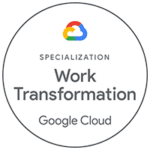SAP on Google Cloud Platform
SAP on GCP: Your SMB on a Cloud Move
Your quest for the right platform to host business-critical SAP workloads is now over. GCP (Google Cloud Platform) is a cloud computing platform created by Google to serve specific business needs. Google Cloud’s greater availability, agility, and native intelligence assists SMBs with large datasets on their SAP workloads. The cloud game changes when Pawa IT combines its SAP experience with managed Google Cloud expertise.

Why Migrate to SAP on Google Cloud
Robust infrastructure
Secure infrastructure with high availability, disaster recovery, and low latency network. SAP on Google Cloud Platform eliminates maintenance downtime with live migration, which means less unexpected downtime for important business processes, resulting in significant savings and an improved user experience.
Scalability
There’s no need to guess capacity for the coming quarter or year – you can scale up or down whenever you need to. You can rapidly develop compute, storage, and networking infrastructure for new SAP projects and systems, including SAP HANA, with faster time to value in minutes rather than the weeks or months that are required with traditional IT infrastructure.
Security and Continuity
Minimize the risk of a security breach. Your SAP data stays secure at all times in the strongly secured Google Cloud. With security and encryption at all levels, your data is probably nowhere safer than on the Google Cloud Platform.
Flexibility
Get all the flexibility your business needs, scaling with ease thanks to the flexible services and pricing models.
Cost optimization
Only pay for what you use, and scale as your business grows. Plus get visibility on your spending and easily optimize costs.
Innovative outcomes
Integrate your SAP data with powerful, innovative technologies by Google. Access cutting edge machine learning and analytics solutions to elevate your customer experience and get advanced business insights



SAP on GCP: The Pawa IT Deployment Process
This includes a thorough review of existing SAP application configuration, release management, and features being used, and all the requirements for the migration.
The adoption plan helps understand the requirements and high-level timeline for the SAP Landscape for current, and future phases and further optimization of the landscape in Google Cloud Platform
Based on the adoption strategy, an estimate is created for the different phases.
Then we define the additional Google cloud integration points
Here the outcome of the strategy and planning phase is a detailed architecture diagram along with a project plan for the short, mid and long term project phases.
Using automated tools or manually filling in discovery with the current environment details such as VMs Sizes, Operating Systems, and Data size and plan accordingly
If required, spinning up an SAP environment on GCP and testing it out to verify technical and business requirements.
Utilizing Migrate for Compute Engine (if a client has VMware, AWS, Azure) for the migration process:
SAP on GCP: The Pawa IT Approach for a Smooth Transition
This is the first call to the client to discover what their needs are.
- What problem are you facing?
- What does your organization do?
- What types of applications are you running?
- What environment are they running in?
- What are the functional and non functional requirements?
What they want Vs What they need:
- How to solve for their pain points (e.g. billing, uptime, reliability, disaster recovery, backup).
- Map their needs to the correct cloud services
Creation of quotes and proposals
- Architect the solution
- Estimate cost
- Evaluate risk
- Move their infrastructure to GCP.
- Move their data to GCP.
- Implement the architected solution.
- Monitor the new infrastructure or solution.
- Ensure that the functional and non-functional requirements are consistently met.
- Optimize cost.
- Adapt the environment to new changes or needs.
Solid Record of our Exemplary Performance
SAP on GCP FAQs
SAP is one of the world’s leading software companies for business process management, creating solutions that help companies handle data and share information more effectively. The term is an abbreviation for “System Analysis Program Development.” SAP created the global standard for enterprise resource planning (ERP) software with the introduction of its original SAP R/2 and SAP R/3 software. SAP S/4HANA now takes ERP to the next level by leveraging in-memory computing to process massive volumes of data and support sophisticated technologies like artificial intelligence (AI) and machine learning.
SAP on Google Cloud is a modern infrastructure solution that can scale flexibly and deliver the availability needed for business-critical applications, plus set SAP customers up for innovation as a practice.
Google Cloud and SAP have an ongoing collaboration to deliver SAP-certified infrastructure for all of your SAP systems. Google Cloud can also be used to power SAP cloud solutions such as SAP S/4HANA Cloud, SAP Ariba, SAP HANA Enterprise Cloud, and the SAP Cloud Platform itself.
Whether you are in charge of core, mission-critical SAP applications in a large business or similarly critical SAP applications in a small enterprise, Google Cloud can help you leverage your SAP data in innovative ways while running your SAP apps more reliably, and securely, and cost-effectively.
Certified partners like Pawa IT Solutions will help you assess, plan, migrate, operate, and optimize your SAP landscapes on Google Cloud.
- Cloud Deployment Manager and other automation technologies, as well as flexible deployment choices, can enable you move your SAP setup to the cloud and deploy at your own pace.
- A flexible virtualized architecture that allows you to resize your machines as your business grows and scale your infrastructure to fit the fluctuations in your workloads, so you can avoid paying for what you don’t need.
- Some of the largest SAP-certified virtual machines (VMs) on the market.
- Built-in capabilities such as Compute Engine live migration and automated restart help to reduce downtime for infrastructure maintenance.
- Opportunities for innovation with Google Cloud databases, data analytics, smart analytics, AI and machine learning, and data integration capabilities
Get started with SAP on GCP today
Choose to innovate and evolve. Migrate your SAP workloads to GCP







